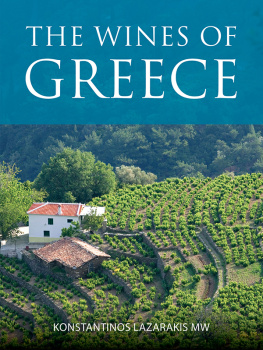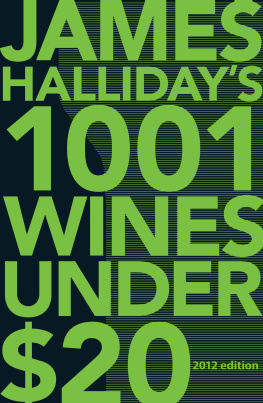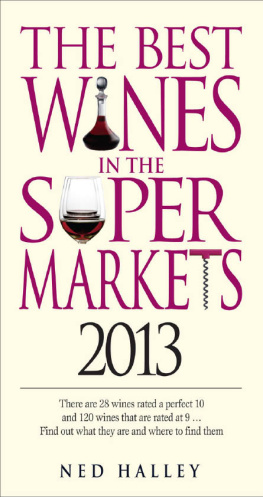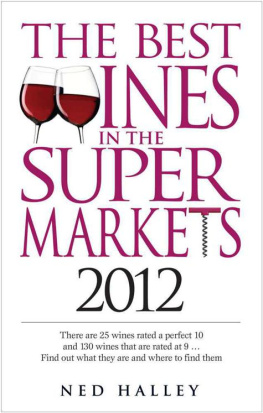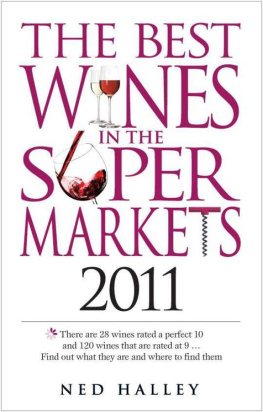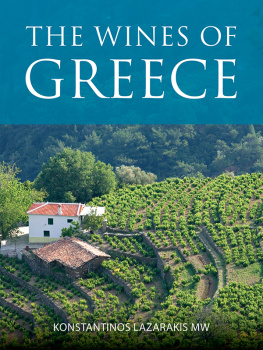Lazarakis Konstantinos - The Wines of Greece
Here you can read online Lazarakis Konstantinos - The Wines of Greece full text of the book (entire story) in english for free. Download pdf and epub, get meaning, cover and reviews about this ebook. publisher: Infinite Ideas, genre: Home and family. Description of the work, (preface) as well as reviews are available. Best literature library LitArk.com created for fans of good reading and offers a wide selection of genres:
Romance novel
Science fiction
Adventure
Detective
Science
History
Home and family
Prose
Art
Politics
Computer
Non-fiction
Religion
Business
Children
Humor
Choose a favorite category and find really read worthwhile books. Enjoy immersion in the world of imagination, feel the emotions of the characters or learn something new for yourself, make an fascinating discovery.
- Book:The Wines of Greece
- Author:
- Publisher:Infinite Ideas
- Genre:
- Rating:5 / 5
- Favourites:Add to favourites
- Your mark:
- 100
- 1
- 2
- 3
- 4
- 5
The Wines of Greece: summary, description and annotation
We offer to read an annotation, description, summary or preface (depends on what the author of the book "The Wines of Greece" wrote himself). If you haven't found the necessary information about the book — write in the comments, we will try to find it.
The Wines of Greece — read online for free the complete book (whole text) full work
Below is the text of the book, divided by pages. System saving the place of the last page read, allows you to conveniently read the book "The Wines of Greece" online for free, without having to search again every time where you left off. Put a bookmark, and you can go to the page where you finished reading at any time.
Font size:
Interval:
Bookmark:
THE INFINITE IDEAS CLASSIC WINE LIBRARY
Editorial board: Sarah Jane Evans MW and Richard Mayson
There is something uniquely satisfying about a good wine book, preferably read with a glass of the said wine in hand. The Infinite Ideas Classic Wine Library is a series of wine books written by authors who are both knowledgeable and passionate about their subject. Each title in The Infinite Ideas Classic Wine Library covers a wine region, country or type and together the books are designed to form a comprehensive guide to the world of wine as well as an enjoyable read, appealing to wine professionals, wine lovers, tourists, armchair travellers and wine trade students alike.
Port and the Douro , Richard Mayson
Cognac: The story of the world s greatest brandy , Nicholas Faith
Sherry , Julian Jeffs
Madeira: The islands and their wines , Richard Mayson
The wines of Austria , Stephen Brook
Biodynamic wine , Monty Waldin
The story of champagne , Nicholas Faith
The wines of Faugres , Rosemary George MW
Cte dOr: The wines and winemakers of the heart of Burgundy , Raymond Blake
The wines of Canada , Rod Phillips
Ros : Understanding the pink wine revolution , Elizabeth Gabay MW
Amarone and the fine wines of Verona , Michael Garner
The wines of Greece , Konstantinos Lazarakis MW
Konstantinos Lazarakis MW became the first Greek Master of Wine in 2002 at the age of 32. He is a member of the Board of Directors of the Institute of Masters of Wine (IMW) and Chairman of the IMW Trips Committee. In 2004 he co-founded Wine & Spirits Professional Center, an educational organization that runs Wine & Spirits Education Trust and Court of Master Sommeliers courses throughout Greece. Konstantinos is Imports Director for Aiolos Wines and consults widely for Enterprise Greece, Aegean Airlines and several other businesses. He also writes for a number of trade and lifestyle magazines and is President of the Balkan International Wine Competition as well as President of the Thessaloniki International Wine and Spirit Competition.

Copyright Konstantinos Lazarakis, 2018
The right of Konstantinos Lazarakis to be identified as the author of this book has been asserted in accordance with the Copyright, Designs and Patents Act 1988.
First published in 2018 by
Infinite Ideas Limited
www.infideas.com
All rights reserved. Except for the quotation of small passages for the purposes of criticism or review, no part of this publication may be reproduced, stored in a retrieval system or transmitted in any form or by any means, electronic, mechanical, photocopying, recording, scanning or otherwise, except under the terms of the Copyright, Designs and Patents Act 1988 or under the terms of a licence issued by the Copyright Licensing Agency Ltd, 90 Tottenham Court Road, London W1T 4LP, UK, without the permission in writing of the publisher. Requests to the publisher should be emailed to the Permissions Department, .
A CIP catalogue record for this book is available from the British Library
ISBN 9781910902691
Brand and product names are trademarks or registered trademarks of their respective owners.
All web addresses were checked and correct at time of going to press.
Front cover Jon Arnold Images Ltd/Alamy Stock Photo
Photos courtesy of Achaia Clauss ().
Maps by Darren Lingard: www.darrenlingard.co.uk
Typeset by Suntec, India
ACKNOWLEDGEMENTS
I have been saying, publicly and repeatedly, that I would never write a second edition of The wines of Greece . It was Richard Mayson, on a bitterly cold morning and over coffee at the Institute of Directors in London, who made me change my mind. Now that I am finished, I feel that I should thank him first.
Richard Burton and Rebecca Clare from Infinite Ideas made this book possible. Nothing that could be written here could fully express my gratitude.
This book would also not have been possible without the precious help of numerous other people. Any attempt to put on paper all those that helped me acquire stamina, information, facts and figures is bound to fail. I am sure that everyone who belongs to that group knows it and saying Thank you is simply not enough. A special mention however has to go to Stavroula Georgopoulou and Thomas Glezakos, from the Directorate of E-Governance of the Ministry of Rural Development and Food, for passing on to me invaluable statistics.
Also, to eagle-eyed Nikos Panidis, my fabulous assistant, who made the writing process so much easier and more enjoyable for me. I wish I had had you on board back in 2005!
This book is for Yiannis Tripkos, Alexandros Tselepidis and Giorgos Tripkos, for their endless support, even before they know what I am up to. They showed me how to flourish.
It is also for my family, Antonia and Anastassios. They never question how I handle possibly the only precious thing I can give them: Time.
PREFACE TO THE FIRST EDITION
It is very difficult for a book about the wines of any one country to be both good and totally impartial. To be good, it should be written by someone with a deep understanding of the subject. An outsider will have an independent point of view but, at the same time, might have problems appreciating where the country and its people come from, why and where they are heading. Wine is not a still life or a photograph it is dynamic. The more you become involved with any subject, the more your background, personal tastes and experiences are bound to be influential, if only at a subconscious level. Therefore impartiality is out of the window, even if the writer goes to great lengths to prevent this.
But is impartiality really needed in a book like this? It is certainly required in matters of judgement, where comparing and finding the best necessitates a well-defined decision-making process and a set of exact criteria. Many wine books include all different kinds of star ratings and scores as a guide for readers. Guidance is needed for a complex topic like wine and the majority of wine-drinkers cannot spend significant amounts of time or money getting acquainted with the huge range of wines from around the world. Even so, with such guides there is an underlying risk that individual tastes can become substituted for a collective one that of the most influential critic. Exchanging personal opinion for a ready-made assurance is an easy but dangerous way to negotiate the intricacies of wine. In addition, it is too tempting for someone to pick up a glass especially if they are in the wrong frame of mind, having a bad day or pre-judging the wine and say this is a bad wine. In my opinion it is not fair to judge a wine by giving it a window of opportunity of less than a minute, three sniffs and two sips.
Beyond such matters of personal taste, people brought up in traditional wine-producing regions find it extremely hard to judge wine based only on what it is in the glass. In countries like Greece, wine has a social dimension that must be taken into account. Agriculture is, most of the time and for most people, a decent kind of poverty. Behind every artisan wine is an immense amount of effort, which has been applied in the hope of creating something worthwhile. Most producers try to make the best they can, according to their preferences, culture, and education. Such attempts are not a part of a marketing strategy but a matter of survival, of struggling for a better future, either for oneself or ones family.
It can be argued that these behind the scenes factors do not concern the average punter and that what is important is how the wine in the glass meets the expectations of the final customer. However, many wine-lovers do have a respect for the people that make a living out of wine-growing. They appreciate that there is more at stake than a small tasting note in a book or magazine: The fruit is not complex, the finish is a bit dry, and it scores seventy-five points out of 100.
Next pageFont size:
Interval:
Bookmark:
Similar books «The Wines of Greece»
Look at similar books to The Wines of Greece. We have selected literature similar in name and meaning in the hope of providing readers with more options to find new, interesting, not yet read works.
Discussion, reviews of the book The Wines of Greece and just readers' own opinions. Leave your comments, write what you think about the work, its meaning or the main characters. Specify what exactly you liked and what you didn't like, and why you think so.

